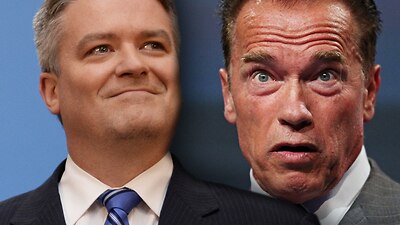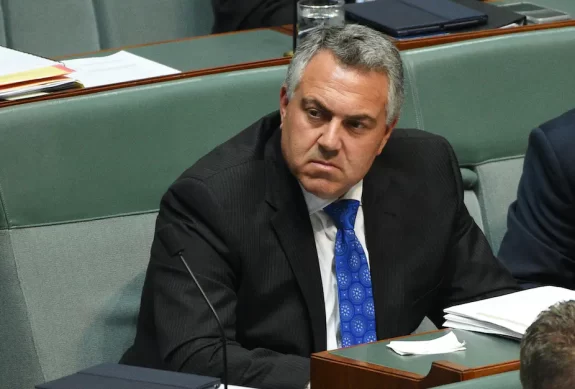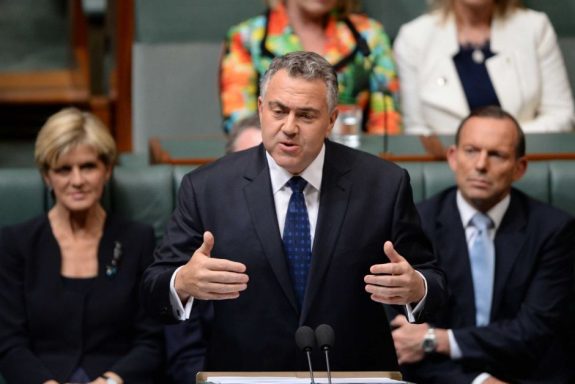In April I wrote an article about the Coalition’s history on superannuation. This is an updated version. Keeping up with their ever-changing promises is turning into quite a saga.
1972
Compulsory national superannuation was initially proposed as part of the 1972 Whitlam initiatives but up until the 1980s superannuation was solely the privilege of predominantly male professions, clustered in the public sector or available after a long qualifying period in the private sector.
1985
In 1985 then Leader of the Opposition, John Howard, said this:
“That superannuation deal, which represents all that is rotten with industrial relations in Australia, shows the government and the trade union movement in Australia not only playing the employers of Australia for mugs but it is also playing the Arbitration Commission for mugs”.
Howard was commenting on the deal between the government and the ACTU which saw the trade union movement forfeit a claim to 3% productivity improvement as wages to instead be paid in compulsory superannuation – endorsed by the Arbitration Commission and managed by superannuation funds with equal representation of the unions in the industry and the employers.
The Coalition has steadfastly opposed every increase in compulsory superannuation since that time, whether it be from 3% to 6%, or the 6% to the current 9.25%.
1995
In the 1995 budget, Ralph Willis unveiled a scheduled increase in compulsory super from 9% to 12% and eventually to 15%. It was to be one of the Keating government’s major legacy reforms.
1996
In its superannuation policy for the 1996 election, Super for all, the Coalition, which had hitherto been implacably opposed to Labor’s policies, promised it:
•Will provide in full the funds earmarked in the 1995 — 96 Budget to match compulsory employee contributions according to the proposed schedule;
•Will deliver this government contribution into superannuation or like savings;
•Reserves the right to vary the mechanism for delivering this contribution so as to provide the most effective and equitable delivery of the funds.
1997
So why don’t we have 15% superannuation now? Because John Howard and Peter Costello nixed it in the 1996 budget barely six months after it released its policy, insisting it was too expensive. They didn’t “vary the mechanism” so much as halted it.
2007
Significant changes were also made to superannuation policy in 2007. The majority of workers could now withdraw their superannuation tax-free upon reaching the age of 60. Most self-employed can claim their superannuation contributions as a tax deduction. In addition, semi-retired people can continue to work part-time, and use part of their tax-free superannuation to top up their pay.
Despite the relatively generous tax treatment of capital gains, the new superannuation tax treatment led to the selling off of some assets, particularly rental housing, as people sought to take advantage of the opportunity to add funds to their superannuation accounts and claim them back later tax-free.
People were allowed to transfer up to A$1 million into their superannuation accounts before the June 30, 2007, after which an annual maximum of A$150,000 of after-tax contributions could be made. The effect of this change in the rules was enormous. In the June quarter of 2007, A$22.4 billion was transferred to superannuation accounts by individuals. This compares with A$7.4 billion in the June quarter of 2006. June 2007 was the first time in Australia that member contributions exceeded employer contributions.
2010
The Coalition’s superannuation policy has drawn mixed reviews, with several major industry bodies expressing disappointment at the policy for being unsubstantial.
The Association of Superannuation Funds of Australia (ASFA), the Australian Institute of Superannuation Trustees (AIST) and the Financial Services Council (FSC) said in a joint statement that a failure to increase the superannuation guarantee (SG) to 12 percent, the failure to raise the concessional caps for individuals over 50 and the failure to provide a super tax contribution rebate for low-income earners would adversely impact Australian workers.
ASFA chief executive Pauline Vamos said that the majority of Australian voters would be disappointed that the Coalition’s only plan for superannuation was the promise of more reviews and delays.
AIST chief executive Fiona Reynolds said: “Australian voters are entitled to expect more than a policy document that has no concrete plans or even fresh ideas on how to address retirement income adequacy and the challenge of Australia’s ageing population.”
2011
OPPOSITION leader Tony Abbott has pointedly put down Victorian Liberal MP Kelly O’Dwyer after she questioned his controversial decision to keep Labor’s higher superannuation guarantee if a Coalition government inherits it.
Ms O’Dwyer asked at yesterday’s party room meeting about the process by which the Coalition’s previous position was reversed – saying it was her understanding such issues should go to the party room.
Mr Abbott said the party room had the right to change policy at any time. But there was no rule – and there should be no expectation – that every policy decision be brought to the party room.
“Mr Abbott, who several times made it clear he did not want to talk about the backflip, said the Coalition would have more to say on superannuation later, but repeated that it would not rescind the higher guarantee.”
Feb 2013
JOURNALIST:
So you would cut all those initiatives?
JOE HOCKEY:
Absolutely, you can’t afford them.
So there it was in black and white – the Coalition was cutting the increase in the super guarantee.
Except, apparently not so: a couple of hours later, Hockey was complaining on Twitter about being misrepresented. “What an MRRT debacle… Despite Govt’s failures we remain committed to not rescinding the increase in compulsory superannuation from 9-12%.” Hockey tweeted. After the Nine Network had accurately reported his remarks, he followed it up with:
Would be nice if Nine News had checked the facts…Coalition remains committed to keeping increase in compulsory superannuation from 9-12%.
Crikey understands Tony Abbott’s office moved immediately after Hockey’s doorstop to indicate there was no change in the Coalition’s support for the move from 9-12%
May 2013
Tony Abbott’s plan to delay the compulsory superannuation guarantee increase for two years and do away with top-ups for low income earners sets the tone for the Coalition’s policy on retirement savings to be announced in coming months.
The Liberal Party’s superannuation policy is likely to encourage individuals to make more voluntary contributions while scaling back government-directed super contributions.
The Coalition seems to be struggling with the concept of superannuation. The Coalition has lost a lot of their super knowledge over recent years with the retirement of many senior MPs, including Peter Costello, who was the architect of the 2007 changes that brought in tax-free super for over-60s, introduced caps on non-concessional contributions, reduced the caps on concessional contributions, and removed limits on the amount of super that you could withdraw at concessional rates. They have promised not to make any unexpected negative changes to super, but hey, a few weeks after making that promise, they announced they were freezing the Superannuation Guarantee increase for 2 years.
November 2013
Labor went to the election promising a 15 per cent tax on superannuation pension earnings over $100,000.
Treasurer Joe Hockey said on Wednesday the policy was too complex and it would be scrapped.
The Treasurer has also decided to cut superannuation co-contributions for low income earners
According to the chief executive of Industry Super Australia, David Whiteley, this would result in 3.6 million Australians on low incomes being out of pocket $500 a year, while just 16,000 of the nation’s top earners will benefit from the scrapping of the 15 per cent tax.
May 2014
Mr Hockey said the discussion on what age people should be allowed to access superannuation had begun inside the Coalition.
When asked if raising the superannuation access age was being considered, Mr Abbott said the government was keeping its commitments regarding superannuation.
”We went into the election saying that apart from a couple of very small already announced changes we weren’t proposing to make any changes to superannuation in this term of Parliament,” he told reporters in Canberra.
”We think that there have been lots and lots of changes to superannuation over the years. Some which we were enthusiastic about, some which we were unenthusiastic about, a period of stability in respect of superannuation is right and proper and there won’t be any changes in this term of Parliament.”
September 2014
Under a deal negotiated with the Palmer United party to repeal the mining tax, employer superannuation contributions will be frozen at 9.5 per cent until 2021 when they increase to 10 per cent.
After that, contributions will increase by 0.5 per cent annually until they reach 12 per cent.
As a result, Labor claims that a 25-year-old Australian earning $55,000 a year will be more than $9000 worse off by 2025. Industry sources say the impact over a 40-year working life could be as high as $100,000, taking into account compound interest.
With the rise of influence of the IPA within our current government’s policy making, this article by John Roskam from 2012 should sound warning bells to us all.
“Compulsory superannuation offends practically every principle of what should be Liberal Party philosophy. If an Abbott government does keep compulsory superannuation it must, at a minimum, make drastic changes.”














